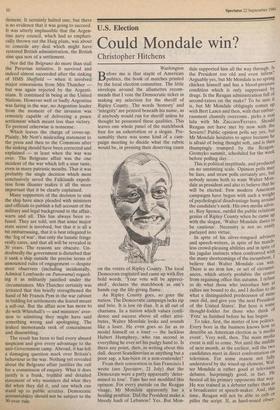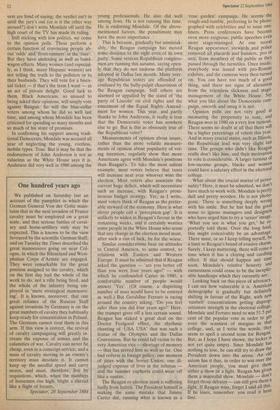U.S. Election
Could Mondale win?
Christopher Hitchens
Washington
Before me is that staple of American politics, the book of matches printed by the local election committee. The little envelope around the allumettes recom- mends that I vote the Democratic ticket in making my selection for the sheriff of Ripley County. The words 'honesty' and `integrity' are printed beneath his name, as if anybody would run for sheriff unless he thought he possessed these qualities. This leaves one whole panel of the matchbook free for an exhortation or a slogan. Pre- sumably there was some kind of a cam- paign meeting to decide what the rubric would be, in pressing their deserving cause
on the voters of Ripley County. The local Democrats cogitated and came up with five bold words. 'Your vote will be appreci- ated', declares the matchbook as one's hands cup the life-giving flame.
As Ripley County goes, so goes the nation. The Democratic campaign lacks zip and brio. It is low on élan. It is all out of charisma. In a nation which values confi- dence and success above all other attri- butes, Walter Mondale looks and sounds like a loser. He even goes so far as to model himself on a loser — the luckless Hubert Humphrey, who ran second in everything he ever set his pudgy hand to. Is there any point, then, in writing about this dull, decent Scandinavian as anything but a poor sap, a has-been or a non-contender?
From their convention in San Francisco I wrote (see Spectator, 21 July) that the Democrats were a party apparently 'deter- mined to lose'. Time has not modified this opinion. For every pustule on the Reagan visage, Mr Mondale apparently has a healing poultice. Did the President make a bloody hash of Lebanon? Yes. But Mon- dale supported him all the way through. Is the President too old and even infirm? Arguably yes, but Mr Mondale is no spring chicken himself and has a blood-pressure condition which is only suppressed by drugs. Is the Reagan administration full of second-raters on the make? To be sure it is, but Mr Mondale obligingly comes up with Bert Lance and then, with that embar- rassment clumsily overcome, picks a real lulu with Ms Zaccaro/Ferraro. Should Reagan not have met by now with the Soviets? Public opinion polls say yes, but Mr Mondale hesitates to agree because he is afraid of being thought soft, and is then thumpingly trumped by the Reagan- Gromyko summit, scheduled for the week before polling day. This is political ineptitude, and produced on no unstinting scale. Opinion polls may be liars, and straw polls certainly are, but nobody seems both to want Walter Mon- dale as president and also to believe that he will be elected. Few modern American campaigns have begun with such a weight of psychological disadvantage hung around the candidate's neck. His own media advis- er, Roy Spence, outdid the public relations genius of Ripley County when he came up with the slogan, 'Walter Mondale dares to be cautious'. Necessity is not so easily parlayed into virtue. In spite of his silver-tongued advisers and speech-writers, in spite of his match- less crowd-pleasing abilities and in spite of his jugular instincts when confronted with the many shortcomings of the incumbent, I believe that Walter Mondale can van. There is no iron law, or set of circumst- ances, which utterly prohibits the centre from regaining office this autumn. I refuse to do what those who introduce him at rallies are bound to do, and I decline to do what a distinguished predecessor of mine once did, and give you 'the next President of the United States'. But here is some thought-fodder for those who think of `Fritz' as finished before he has begun. To take, first, the matter of low politics. Every bore in the business knows how to describe an American election as 'a media event'. Very well, then. The main media event is still to come. Not until the middle of next month, at the earliest, will the two candidates meet in direct confrontation on television. For some reason not fullY understood by the wised-up element, Wal- ter Mondale is rather good at television debates. Surprisingly good, in fact. He bested all his primary opponents that way. He was trained as a debater rather than as a broadcaster or speech-maker. And, this time, Reagan will not be able to crib or pilfer the script. If, as hard-nosed obser-
vers are fond of saying, the verdict isn't in until the jury's out (or is it the other way around?) don't write Mondale off until the high court of the TV has made its ruling.
Still sticking with low politics, we come to the opinion polls. These perform a certain function of convincing people ab- out 'odds' and 'front-runners' in the 'race'. But they have underdog as well as band- wagon effects. Many women (and especial- ly, as I think, many Hispanic women) are not telling the truth to the pollsters or to their husbands. They will vote for a bisex- ual ticket — if that's the term I want — as an act of private delight. Good luck to them. Black Americans, so unused to being asked their opinions, will simply vote against Reagan. So will the blue-collar voters among whom he did so well last time, and among whom Mondale has been criticised for spending so many months and so much of his store of promises.
In confirming his support among tradi- tional Democrats, Mondale was accused all. year of neglecting the young, rootless, mobile types. True. But it may be that the endorsement of John Anderson is not as valueless as the White House says it is. Anderson did very well in 1980 among the young professionals. He also did well among Jews. He is not running this time. He is endorsing Mondale. Of the above- mentioned factors, the penultimate may have the most importance.
This is because, gradually but unmistak- ably, the Reagan campaign has moved some distance to the right even of its own party. Some veteran Republican congress- men are running this autumn, saying open- ly that they do not endorse the platform adopted in Dallas last month. Many aver- age Republican voters are offended or confused by the bully-pulpit chauvinism of the Reagan campaign. Still others are alarmed or appalled by the stand of 'the party of Lincoln' on civil rights and the enactment of the Equal Rights . Amend- ment for women. This year, and partly thanks to John Anderson, it really is true that the Democratic voter has nowhere else to go. But is this as obviously true of the Republican voter?
Measurements of opinion about issues, rather than the more volatile measure- ments of opinion about popularity of vot- ing intention, regularly show that more Americans agree with Mondale's positions than Reagan's. To take the most salient example, most voters believe that taxes will increase next year whoever wins the election. Most voters also associate the current huge deficit, which will necessitate such an increase, with Reagan's prom- iscuous budget strategy. Yet, as I write, most voters think of Reagan as the prefer- able steward of the economy. Here is what clever people call a 'perception gap'. It is unlikely to widen in Reagan's favour in the remaining weeks, and it certainly worries some people in the White House who sense that any change in the election mood must, after such a run of luck, be for the worse.
Similar considerations bear on attitudes to Central America, to arms control, to relations with Eastern and Western Europe. It must be admitted that if Reagan asked the question — 'are you better off than you were four years ago?' — with which he confounded Carter in 1980, a comfortable number of people would answer 'Yes'. (Of course, a dispiriting number of noes would have to be entered as well.) But Geraldine Ferraro is racing around the country asking, `Do you feel safer than you did four years ago?' Here, the trumpet gives off a less certain sound. Reagan has staked a great deal on the Doctor Feelgood effect, the rhythmic chanting of 'USA USA' that was such a featue of the Olympics and the Dallas Convention. But he could fall victim to the very American vice — shortage of memory — that has served him so well so far. One bad reverse in foreign policy; one moment of jitter with the Soviet Union; one ill- judged expense of lives in the isthmus and the summer euphoria could wear off like a suntan.
The Reagan re-election team is suffering badly from hubris. The President himself is making the same mistake that Jimmy Carter did, running what is known as a
'rose garden' campaign. He scorns the rough-and-tumble, preferring to be photo- graphed with celebrities and to issue one- liners. Press conferences have become even more exiguous; public speeches even more stage-managed. At one recent Reagan appearance, stewards and police removed all placards and banners, pro or anti, from members of the public as they passed through the turnstiles. Once inside, everybody was issued with pro-Ronnie exhibits, and the cameras were then turned on. You can have too much of a good thing, and there are signs of alienation from the relentless slickness and stage- management of the White House. Say what you like about the Democratic cam- paign, smooth and smug it is not. Opinion polls are not very good at measuring the propensity to vote, and Reagan won in 1980 on a very low turnout. There seems no doubt at all that there Will be a higher percentage of voters this year. And in many crucial states, such as Illinois, the Republican lead was very slight last time. The groups who didn't like Reagan really don't like him, and their motivation to vote is considerable. A larger turnout of low-income groups, blacks and women could have a salutary effect in the electoral college.
What about the crucial matter of perso- nality? Here, it must be admitted, we don't have much to work with. Mondale is pretty dull and pretty wooden. He is not photo- genic. There is something deeply wrong with his smile. But he has had the good sense to ignore managers and designers who have urged him to try a 'sexier' image. `What you see is what you get,' he re- portedly told them. Over the long haul, this might conceivably be an advantage- There must, or so I keep telling myself, be a limit to Reagan's brand of evasive charm. Surely, I keep muttering, there will come a time when it has a cloying and curdling effect. If that should happen any time soon, Mondale's relative honesty and earnestness could cease to be the inexplic- able handicaps which they currently are. Looking back on this piece of advocacy, I can see how vulnerable it is. American demography is gradually but definitely shifting in favour of the Right, with new 'sunbelt' concentrations getting disprop- ortionate strength in the electoral college- Mondale and Ferraro need to win 51.5 per cent of the popular vote in order to get even the scantiest of margins in that college, and, as I write the words, they seem to spell a second term for Reagan. But, as I hope I have shown, the locker is not yet quite empty. Since Mondale has nothing to lose, he can still try to draw the President down into the arena. An old axiom has it that, in order to win over the American people, you must give them either a show or a fight. Reagan has given them a masterful show. Mondale — don't forget those debates — can still give them a fight. If Reagan wins, forget I said all this. fIifrshte loses, remember: you read it here











































 Previous page
Previous page